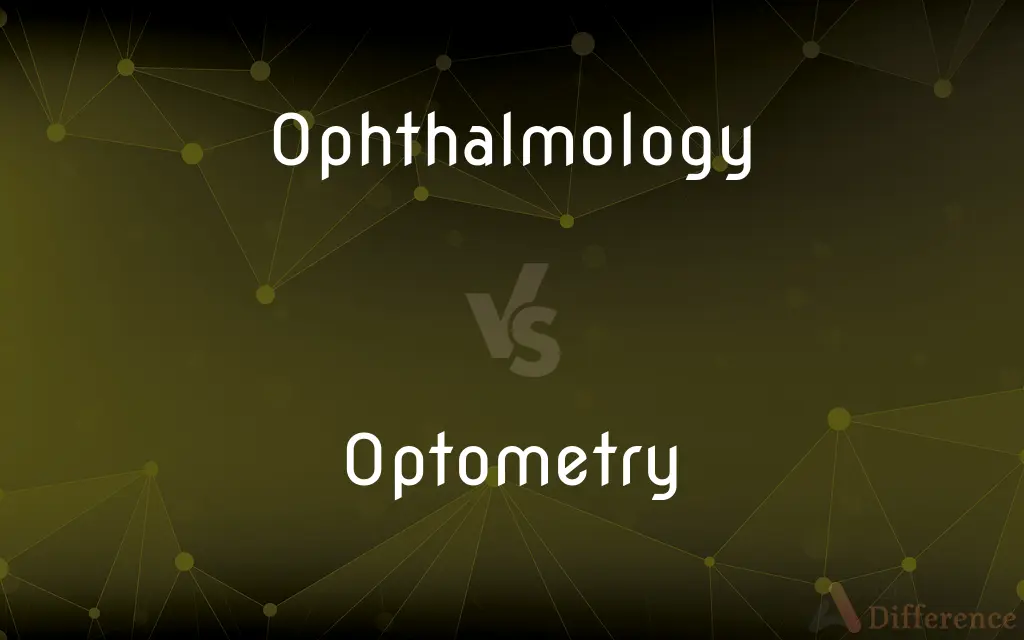Ophthalmology vs. Optometry — What's the Difference?
By Tayyaba Rehman — Updated on September 23, 2023
Ophthalmology is the medical specialty focused on diagnosing and treating eye diseases, while Optometry emphasizes eye care and vision correction without surgery.

Difference Between Ophthalmology and Optometry
Table of Contents
ADVERTISEMENT
Key Differences
Ophthalmology and Optometry, while related to eye care, have distinct focuses and training requirements. Ophthalmology delves into the medical and surgical care of the eyes, tackling various diseases and conditions. Optometry, in contrast, mainly concentrates on vision care, including the prescription of corrective lenses.
Both Ophthalmology and Optometry are integral to the eye care industry, but their roles differ. Ophthalmologists are medical doctors (MDs) or osteopathic doctors (DOs) trained to perform surgeries and manage complex eye conditions. Optometrists, however, are not medical doctors but hold a Doctor of Optometry (OD) degree, focusing on routine vision care and minor eye conditions.
Ophthalmology, being a branch of medicine, offers specialized treatments such as surgeries for cataracts, glaucoma, or retinal issues. These professionals often work in hospitals or specialized clinics. Optometry, meanwhile, is more about primary eye care, including conducting eye exams, diagnosing vision problems, and prescribing glasses or contact lenses.
The education for Ophthalmology and Optometry differs as well. An ophthalmologist completes medical school, followed by a residency in ophthalmology. Optometrists attend optometry school, which is separate from medical school, and they do not undergo a standard medical residency.
In terms of patient interactions, those seeking regular eye check-ups or new eyeglass prescriptions might see an optometrist. Those needing surgical interventions or facing severe eye diseases would generally consult an ophthalmologist.
ADVERTISEMENT
Comparison Chart
Primary Focus
Medical and surgical eye care
Vision care and corrective lenses
Degree
MD or DO
OD
Treatment Capabilities
Can perform surgeries
Cannot perform surgeries
Education
Medical school + ophthalmology residency
Optometry school
Typical Work Setting
Hospitals or specialized clinics
Eye care clinics or retail settings
Compare with Definitions
Ophthalmology
Branch of medicine concerning the eye's anatomy and function.
His interest in the intricacies of the eye led him to study Ophthalmology.
Optometry
The profession of examining eyes for visual defects and prescribing corrective lenses.
After years in Optometry, she had seen a wide variety of vision issues.
Ophthalmology
The medical specialty dedicated to eye diseases.
She chose a career in Ophthalmology because she wanted to perform eye surgeries.
Optometry
Helps diagnose and manage minor eye conditions.
If you need a new prescription for your glasses, an Optometry clinic is a place to go.
Ophthalmology
Deals with vision and eye health.
Ophthalmology has made great strides in treating previously incurable eye conditions.
Optometry
Focuses on primary eye care and vision services.
Optometry clinics are commonly found in malls and shopping centers.
Ophthalmology
Often involves collaboration with optometrists for comprehensive care.
The Ophthalmology department works closely with optometrists to ensure all patients' needs are addressed.
Optometry
Emphasizes patient education on eye health.
A significant part of Optometry is teaching patients about eye care.
Ophthalmology
Focuses on both surgical and non-surgical eye treatments.
Ophthalmology clinics often have advanced equipment for various procedures.
Optometry
Does not involve surgical interventions.
Optometry training emphasizes the diagnosis of vision problems and the prescription of glasses.
Ophthalmology
Ophthalmology () is a branch of medicine and surgery that deals with the diagnosis and treatment of disorders of the eye. An ophthalmologist is a physician who specializes in ophthalmology.
Optometry
Optometry is a health care profession that involves examining the eyes and applicable visual systems for defects or abnormalities as well as prescribing the correction of refractive error with glasses or contact lenses and the treatment of eye diseases. Traditionally, the field of optometry began with the primary focus of correcting refractive error through the use of spectacles.
Ophthalmology
The branch of medicine that deals with the diagnosis and treatment of diseases and disorders of the eye.
Optometry
The practice or profession of an optometrist.
Ophthalmology
(medicine) The anatomy, functions, pathology, and treatment of the eye.
Optometry
The art and science of vision and eye care.
Ophthalmology
The science which treats of the structure, functions, and diseases of the eye.
Optometry
Measurement of the range of vision, esp. by means of the optometer.
Ophthalmology
The branch of medicine concerned with the eye and its diseases
Optometry
As defined (with minor variations) in the statutes of various States of the United States:
Optometry
The practice of an optometrist
Common Curiosities
Who should I see for a routine eye check-up?
For routine check-ups and vision tests, you can see an optometrist.
Are Ophthalmology and Optometry the same?
No, Ophthalmology deals with medical and surgical eye care, while Optometry focuses on vision care without surgery.
Where do ophthalmologists receive their training?
They attend medical school followed by a residency in Ophthalmology.
What's the main focus of Optometry?
Optometry primarily focuses on vision care, eye exams, and prescribing corrective lenses.
Who should I consult if I think I need eye surgery?
An ophthalmologist, as they specialize in surgical eye treatments.
Can optometrists perform eye surgeries?
No, only ophthalmologists are trained to perform eye surgeries.
Are there treatments only an ophthalmologist can provide?
Yes, especially surgical interventions and treatments for severe eye diseases.
Do optometrists and ophthalmologists work together?
Yes, they often collaborate to provide comprehensive eye care to patients.
Can optometrists diagnose eye diseases?
Yes, they can diagnose many eye conditions, but complex cases may be referred to an ophthalmologist.
Can an ophthalmologist prescribe glasses?
Yes, they can, but it's more common to get prescriptions from optometrists.
Who can treat conditions like glaucoma or cataracts?
Ophthalmologists are specialists trained to treat conditions like glaucoma and cataracts, often surgically.
Share Your Discovery

Previous Comparison
Cowperson vs. Cowgirl
Next Comparison
Acceleration vs. DecelerationAuthor Spotlight
Written by
Tayyaba RehmanTayyaba Rehman is a distinguished writer, currently serving as a primary contributor to askdifference.com. As a researcher in semantics and etymology, Tayyaba's passion for the complexity of languages and their distinctions has found a perfect home on the platform. Tayyaba delves into the intricacies of language, distinguishing between commonly confused words and phrases, thereby providing clarity for readers worldwide.














































